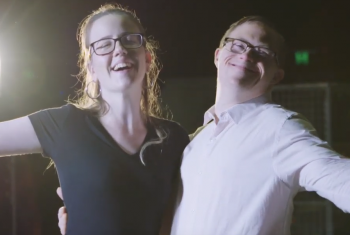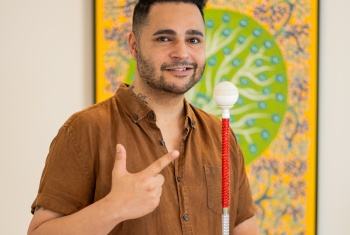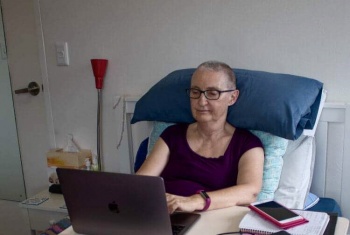With a successful international film and television career taking him around the world, a beautiful, loving wife and a grown son, Ade Djajamihardja was living a dream life. Knowing how lucky he had been and wanting to share his good fortune, he joined the voluntary board of Disability Media Australia in 2011 in an effort to make a difference in the lives of people in his industry with a disability.
Three days later, at the age of just 42, Ade suffered a massive haemorrhagic stroke requiring life-saving brain surgery and acquired a life-long disability – turning him into the “most dedicated board member” that had ever served according to the Disability Media Australia CEO.
In a matter of seconds, Ade and his wife Kate’s lives were turned upside down. Ade would spend the next three months in hospital learning to breathe, eat independently and sit upright, and another four in a rehabilitation facility re-learning basic motor skills. He was left with permanent left-sided paralysis, limited vision and a wheelchair, thrusting Kate into the 24-7 role of carer.
“When Ade was being taken from the hospital to rehabilitation, the social worker told me that the week prior they had been looking at nursing homes for Ade and weren’t going to send him to rehab. I said ‘I will never have let that happen, he’s coming home with me, I’ll look after him no matter what’,” Kate said.
“I don’t think they thought I could do it all.”
Ade’s film and television career began at the age of 19 when he began working as a floor manager for the ABC television news in Melbourne. He soon advanced to assistant director positions with iconic Australian productions including Countdown Revolution with Molly Meldrum, the children’s program Big Square Eye and The Late Show before relocating to Malaysia and working as a producer and CEO of Ten on Ten Pictures Malaysia. He went on to co-produce what was then the biggest historical epic film in Malaysia’s history, Puteri Gunung Ledang (A Legendary Love), which was the first Malaysian film to have been shortlisted in consideration for Oscar nomination.
Returning to Australia in 2007, Ade and Kate founded a production company called A2K Media and went on to produce Salam Café (SBS 2008) which was the first Muslim entertainment program to be screened prime time in a Western country, a feature film called Kambing Jantan (Male Goat) which reached number one at the Indonesian box office, and a business reality program broadcast on BBC in Singapore.
While the stroke that had a 50% chance of taking his life may have slowed him down a bit, it hasn’t stopped him and it certainly hasn’t changed his go-getter mentality. In the past eight years, Ade has learned to read and write again, written a best-selling book about his ordeal entitled The Little Book of Hope using only his iPhone, graduated with a Masters of Screen Arts and Business from the Australian Film, Television and Radio School, and begun a speaking career talking about his experiences.
With the help of his wife and daily exercise sessions, he is incredibly now able to walk with support. On most days, Kate and Ade can be seen walking along the foreshore near their Brighton home where they are buoyed by the support of the neighbourhood locals who often stop to marvel at his progress.
“I spend three hours a day with him on his feet in small bursts; 100 metres here, 100 metres there, and we’ve built it up to one kilometre over about three hours,” Kate said proudly.
“Technically just outside Olympic qualifying time!” Ade laughed.
His goal now is to re-enter the film and television industry and use his experience to shine a light on the unique and often unseen challenges faced by people with a disability as they navigate an able-bodied world.
After recently joining the National Disability Insurance Scheme (NDIS), Ade is now confident that he will be able to fulfil this goal in addition to giving Kate – who Ade calls his “wife, primary carer, closest confidante, best friend and all round chief-of-stuff” - a much-needed rest.
Ade will now have a support worker at home, respite accommodation, a new wheelchair, assistive technology including an electronic bed, occupational therapy, home modifications, community access funding and transport funding.
“When I found out that the NDIS was rolling out in our area, my overwhelming emotional response was a trilogy of thoughts – relief, gratitude and cautious optimism,” Ade said.
“Relief because Kate was in urgent need of some respite because she works so hard to take care of me, and I want my wife back rather than putting this 24-7 carer work on her.”
“Gratitude because I feel incredibly appreciative to live in a country with there’s such a social conscience and duty of care that they choose to take care of us all, even the most vulnerable, on the basic premise that we all have value.”
“Cautious optimism because I never like to complain but I’m very positive that my overriding goals of wanting to re-emerge back into the screen industry, become more independent and undertake meaningful and substantive work is going to become reality with the NDIS.”
A romantic at heart, Ade was also excited about the prospect of taking his wife out on a date and making her a coffee in the morning.
“I used to make her a coffee every morning but now obviously being able to deal with a kettle of boiling water is challenging,” Ade said.
“They’re just silly little things, but they’re important.”
Despite their own challenges, Ade and Kate remain remarkably focused on making a difference in the lives of other people with disabilities, and Ade is committed to harnessing his television production skills to do so.
With Kate’s help, he has developed a concept for an online disability advocacy program called Sit Down Comedy which is aimed at “disabling discrimination” by exploring different themes which affect people with disabilities, such as finding a toilet, sex life, and assistance animals through sketch comedy.
Ade said Sit Down Comedy will be unafraid to shock people into taking notice of the many issues people with a disability face, and hopefully have a positive effect on attitudes and behaviour.
“Humour plays such an important and effective role as a defence mechanism to an often confusing and complicated world around us. Our sketches will help people confront and understand disability,” Ade said.
“People with a disability are the most underrepresented group on our screens. Being conspicuous due to our absence is not the solution, it’s the problem.”
Kate said that she and Ade hoped that the roll out of the NDIS would provoke public discussion and awareness of disability and accessibility throughout the country.
“I really think the NDIS will mean people with disability are more empowered and so things will start to change. I see people in their wheelchairs at the beach, and the carer takes the dog to the dog beach and this person is just left sitting there,” Kate said.
“Things like ramps can change that. Simple little things that shouldn’t be too hard to change.”
Ade said it was important to him to leave a legacy that would help other people with disabilities to learn how to cope emotionally, as he himself had done while in hospital following his stroke.
“In my opinion, hope is the single game-changer that gives us the strength to take on our greatest challenges,” Ade said.
“Every morning and every night while I was in hospital, I would think about five things that I was grateful for. I couldn’t write so I just thought of them.”
“The battle is won or lost in the mind, and I cope by maintaining an attitude of gratitude as a means of responding to life’s adversities.”
“The greatest journeys begin with a single step. I’ve done the first step and I’ll get more steps in!”
National Stroke Week is 3 to 9 September.


